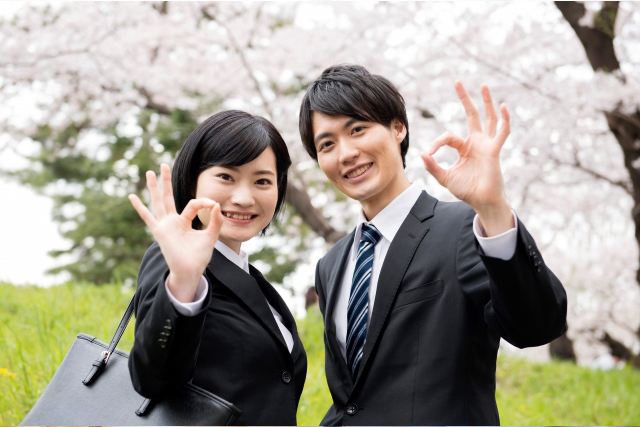Dresscode for Japanese Job Interviews – Recruit Suits

by Chloé
You may know that Japan has set rules when it comes to the corporate world. Job interviews are no exception. To leave a good impression, you should think about your appearance nearly as much as the content of the interview.
More professional experience comes with more freedom in how to dress. For new graduates and entry-level job interviews however, follow the tips in this article and rock you best Japanese-style recruit suits.
コンテンツ
Recruit suits: A sign for adaptability?
Japanese recruiters are mostly interested in your personality, and how well you can fit in the company (especially for new graduates). Therefore, they are often looking for someone with good adaptability. Did you know that in many companies new recruits keep wearing the uniform recruit suits for their entire training period? Even after you entered the company as new graduate (新卒, しんそつ), the suit is a safe choice and signals everyone that you are still new on the job.
I will present the basics of Japanese dress etiquette to follow for both men and women, to be sure not to make a faux-pas during the interview that may change your life. As it is essential to leave a good first impression, do not take this lightly and stack the odds in your favor.
Let’s get started!
Formal wear
It may be recommended to wear a suit during job-hunting in your home country, but in Japan it is a must. It is so essential here, it became the uniform for students during the job-hunting season, and is called リクルートスーツ (recruit suits).
It consists of black or dark pants/skirt suit and a white shirt.
For women, do not wear a skirt that would be considered too short (just above the knee is fine), and watch out for runs in your stockings. Better take an extra pair in your bag, just in case.
For men, choose a tie and socks that match your suit.
The job interview is not the time for you to try to stand out with your looks, your goal is mostly to blend in and show that you understand the Japanese way of doing things. Google ‘recruit suit’ and uncover the job-hunting black and white world.
However, if you are looking for a mid-career job, and are not in your early 20s anymore, avoid the recruit suit and go for a nice, navy or grey, well-made suit if you can. This will leave a better impression, as recruit suit is typically worn by young, inexperienced students.
Overall, avoid colorful or eye-catching clothes and keep it simple and neat. Obviously, you should not wear clothes that have any stains, wrinkles, holes, or strong smell.
Shoes
Job-hunting graduates wear black pumps for women and black brogue shoes for men, to go with their recruit suit. Avoid shoes with high heels, save them for your next date. For mid-career, choose them in a color that goes well with your suit.
Polish your shoes, and check that your heels are not worn out. Take them to a repair shop if needed.
Accessories
In general, avoid any bold, outstanding accessories, or those that make a sound when you move. Also leave your hats and caps at home for fancier occasions.
You will need a briefcase type of bag, essential to carry your resume and any other documents. Having it match your suit, or picking a black one is the safest choice.
Make sure it is big enough to easily fit A4 documents without bending, you don’t want to hand out a wrinkled resume.
Also, better not use contact lenses or wear anything that would distract the interviewer, or allow him/her to categorize you in any way (Tattoos and piercings are generally unacceptable in Japan, you should take them out or cover them up.)
Hair
Most Japanese people wash their hair daily, and expect you to always have freshly washed hair. That is even more so during job interview.
You should also watch for bed hair, which is a no-no here. Tie your hair if it is long enough.
Avoid colorful hair color or dying. Japanese companies usually require their employees to have black or dark brown hair – if your natural hair color is blond, no problem of course. Japanese students with hair color usually dye them black when they look for a job.
Makeup
Keep your makeup natural and basic, nothing too flashy.
However, I would not advise to go makeup-free. In Japan, it is often seen as courtesy to wear makeup, to show respect to the people around you by being presentable. You need to find the right balance, foundation, eyeliner, light blush and powder, there you go.
Avoid bold eyelash extensions, flashy eye-shadows or lipsticks, and thick eyeline.
Nails
Keep them short and clean, without polish or a natural color one.
It’s better to not attract attention to your nails, but taking care of them is a must to show that you are detail-oriented and clean.
Perfume
Avoid heavy perfume, better not wear any than too much. Japanese people are not using perfume as much as in the West.
It is seen as rude or inconsiderate for people around you, as you force them to smell your perfume. Especially in trains and at work, where they cannot escape and can be distracted by it.
Show your consideration and leave N︒5 in the cabinet for the day.
You’re all set!
Keep in mind that it also depends on the sector you are applying to: banks and insurance companies will be stricter, while fashion or music industry might allow more eccentricity and even expect it.
The advice I gave in this article are mainly referring to interviews for full-time job, therefore you do not have to go as far when interviewing for a part-time job.
Good luck for your job search!




